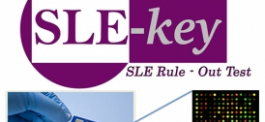
SLE-key™ Rule Out test to be run out of VERACIS
ImmunArray, developer of the iCHIP™, a groundbreaking in-vitro auto-antibody profiling platform is pleased to announce the launch of their first commercial diagnostic product, SLE-key™ Rule Out, designed to provide physicians the ability to rule out a diagnosis of SLE (Systemic Lupus Erythematous) with a high degree of certainty. The test was developed and validated on a panel of 200 antigens in a 500 patient clinical study performed in collaboration with leading academic rheumatologists. The product will initially be provided on a limited release basis to a select group of academic and leading community based practicing Rheumatologists.
“The launch of our first commercial product is a key milestone in the growth of ImmunArray” according to company CEO, D. Scott Batty Jr. MD. “The test, which demonstrated a high degree of precision of the platform will enable us to build our US presence as we demonstrate the depth of information that our technology can provide.”
Donna J. Edmonds, ImmunArray’s Chairperson and founding member of Virginia Life Science Investments, (VLSI) states: “SLE-key™ Rule Out is the first of a suite of tests that will be processed at our VERACIS service laboratory, a subsidiary of ImmunArray USA in Richmond VA. The iCHIP™ technology offers the field an advanced and unique ability to detect and monitor human health and disease by using the immune system as a window into the state of the body. ImmunArray’s technology thus provides an important tool in our rapidly changing healthcare environment. ImmunArray is a key company in the VLSI portfolio and potentially enables a wide range of applications to help reduce costs and improve care in both the diagnostic and pharmaceutical markets.”
The information content and versatility of the iCHIP™ platform also creates a breadth of unique and objective information useful to pharmaceutical partners. This information can be used to support selection of best-in-class clinical candidate compounds for development and improving development efficiency by identifying “high responder” subsets of patients. In addition, this platform will allow for the development of companion diagnostics to identify patients most likely to benefit from therapy and support reimbursement.


